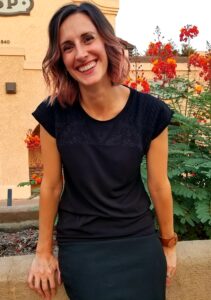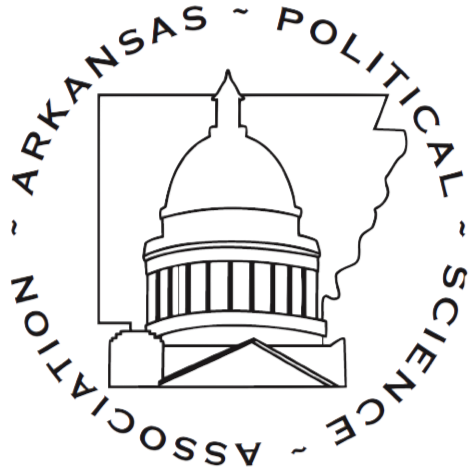The following story is the seventh installment of the Political Science in Arkansas interview series, where we profile political scientists throughout the state. Today we talk with Dr. Rebecca Glazier, who is an Associate Professor in the School of Public Affairs and in the at University of Arkansas Little Rock, where she has worked since 2009. She did her Ph.D. at the University of California Santa Barbara. Her research focuses on religion, framing, and U.S. foreign policy. She has published articles and book chapters on political Islam, religiously-motivated violence in Iraq, and just war theory. She teaches courses on global terrorism, and religion and politics; and teaches the ULAR Model Arab League courses that compete in Model UN and Model Arab League conferences around the country. Her most recent book Connecting in the Online Classroom: Building Rapport between Teachers and Students (Johns Hopkins University Press) focuses on online teaching.
political scientists throughout the state. Today we talk with Dr. Rebecca Glazier, who is an Associate Professor in the School of Public Affairs and in the at University of Arkansas Little Rock, where she has worked since 2009. She did her Ph.D. at the University of California Santa Barbara. Her research focuses on religion, framing, and U.S. foreign policy. She has published articles and book chapters on political Islam, religiously-motivated violence in Iraq, and just war theory. She teaches courses on global terrorism, and religion and politics; and teaches the ULAR Model Arab League courses that compete in Model UN and Model Arab League conferences around the country. Her most recent book Connecting in the Online Classroom: Building Rapport between Teachers and Students (Johns Hopkins University Press) focuses on online teaching.
QUESTION: You have published several journal articles on religion and politics. What drove your interest in the topic? Did your findings in the published works counter your expectations that you had going into the project?
Before I started the Little Rock Congregations Study, I did most of my work in religion and politics on foreign policy and international conflict. I know a lot of people who are deeply motivated by their personal religious beliefs in many aspects of their lives—and I consider myself a person of faith as well—and I didn’t think political science took those kinds of beliefs very seriously. My experimental work on providential religious beliefs in US foreign policy as well as survey and interview work with religious peacemakers in conflicts around the world demonstrate that religion does matter for the political choices and actions people take.
QUESTION: Do you think political science does an adequate job of addressing the relation between religion and politics? What do you think scholars do well; what do they get wrong?
Because political science is a social science with a positivist tradition, which I am a part of and generally a big fan of, it sometimes doesn’t quite believe people when they say religion is important to them or that they are doing something for religious reasons. Political scientists sometimes want to say that we know what they really mean—its about resources or identity or ideology. But sometimes we need to take people at their word and believe them when they say their faith influences their choices.
QUESTION: You have led the Little Rock Congregation Study for almost 10 years now at ULAR. Tell us what it is, how you use it as a teaching tool, and what doing it has taught you.
The Little Rock Congregations Study is a longitudinal, community-based research project with three main goals:
- To improve our understanding of the impacts of faith-based community engagement
- To get students out of the classroom and into the community to learn and give back
- To provide relevant and meaningful findings to the community
Students have been involved in the project since it started in 2012 and over 180 students have participated as researchers. They help develop survey questions, write community spotlights, visit local congregations, and test original hypotheses in our data. They interview clergy and write reports that we share with congregations and community members. I have learned so much from doing this work! I love watching the students engage in the community and learn in hands-on ways. I love knowing that the work we are doing is really helping congregations and not just sitting on dusty library shelves. It has really taught me the importance of relationships when doing community-based work, something that challenged us in our data collection efforts during the pandemic, when we couldn’t connect face-to-face in the ways we were used to.
QUESTION: How does online education look at its best; how does it look at its worst?
During the pandemic, I think we have all seen online education at both its best and its worst—sometimes in our own classes! Good online classes look a lot like good face-to-face classes. They have instructors who care about their students, are engaged, and enthusiastic. Research I have done with Heidi Skurat Harris shows that what really makes excellent online classes is clear communication and assignment design. Without face-to-face explanations for assignments, the students really rely on the assignments themselves, so the assignments have to be clear and well-written. Our surveys of students show that the worst online classes are those where the professor just checks out, uses only publisher-provided content, or is unclear about expectations. Online classes don’t have to be perfect to be good. Professors can make them much better by intentionally making real human connections with students—what I calling building rapport.
QUESTION: What techniques can faculty utilize to build rapport with their students and increase student success?
In my new book, Connecting in the Online Classroom: Building Rapport Between Students and Teachers (Johns Hopkins, 2021), I spend an entire chapter just giving examples of how to build rapport. There are so many ways we can connect with our students to create these important relationships! One key principle is what Michelle Pacansky-Brock calls “humanizing,” or facilitating students and the professor sharing their human sides with one another. You can do this by having a discussion thread about where the best tacos are in the city, or by chatting with students about what they are binge watching before class starts, or by letting your cat sit in on your lecture videos. Sharing humanity will help students stay engaged in the class, which makes them more likely to participate, complete assignments, and be successful.
QUESTION: You advise a Model Arab League at your school. What is Model Arab League? What impact does it have on the students? What lessons have you learned while running it, and what advice might you give to faculty who might want to start a Model Arab League at their school?
I love advising our Model Arab League team. It is a lot like Model UN, but with only the 22 countries that are in the League of Arab States. It is a simulation of that international organization, so the students are assigned a country to represent, they research that country, and then they work with other students representing other countries to try to pass resolutions on topics of interest in the Arab World. I take our team to Washington, DC every year for the National Model Arab League conference and it is a really great experience for the students. They learn skills in research, public speaking, diplomacy, writing, and negotiation. A lot of my Model Arab League students go on to law school. I have found that it is helpful to teach a class associated with the team and the conference, because the student population that I teach is very busy, so a strictly extracurricular club is unlikely to draw enough students to fill our team. But other universities may have different student populations.
QUESTION: Beyond Arab League, you have several other examples of utilizing experiential learning in your teaching. Tells us about them. What have you learned from engaging in experiential learning in these instances?
Students learn so much when they are doing things, as opposed to being passive recipients of knowledge. I love to travel with students, use simulations in my classes, get students involved in research, use service learning, and even publish articles with student co-authors. The research that I have done on these different types of experiential learning shows again and again that it benefits students in terms of their learning and in terms of their enjoyment of the course and the material. And, speaking from my own perspective, it makes teaching a lot more fun.
